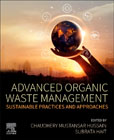
Advanced Organic Waste Management: Sustainable Practices and Approaches
Hussain, Chaudhery Mustansar
Hait, Subrata
Advanced Organic Waste Management: Sustainable Practices and Approaches provides an integrated holistic approach to the challenges associated with organic waste management, particularly related to sustainability, lifecycle assessment, emerging regulations, and novel approaches for resource and energy recovery. In addition to traditional techniques, such as anaerobic digestion, composting, innovative and emerging techniques of waste recycling like hydrothermal carbonization and vermicomposting are included. The book combines the fundamentals and practices of sustainable organic waste management with successful case studies from developed and developing countries, highlighting practical applications and challenges. Sections cover global organic waste generation, encompassing sources and types, composition and characteristics, focus on technical aspects related to various resource recovery techniques like composting and vermicomposting, cover various waste-to-energy technologies, illustrate various environmental management tools for organic waste, present innovative organic waste management practices and strategies complemented by detailed case studies, introduce the circular bioeconomy approach, and more. Presents the fundamentals and practices of sustainable, organic waste management, with emerging regulations and up-to-date analysis on environmental management tools such as lifecycle assessment in a comprehensive manner Offers the latest information on novel concepts and strategies for organic waste management, particularly zero waste and the circular bioeconomy Includes the latest research findings and future perspectives of innovative and emerging techniques of waste recycling, such as hydrothermal carbonization and vermicomposting INDICE: PART 1: Organic Waste: Generation, Composition, and Health Hazards 1. Worldwide Organic Waste Generation - Developing and Developed Countries 2. Composition and Characteristics of Organic Waste - Domestic, Industrial, and Natural Sources 3. Environmental and Health Hazards PART 2: Resource Recovery from Organic Waste 4. Composting and Vermicomposting 5. Do-It-Yourself (DIY) Composting and Vermicomposting for Urban Households 6. Novel Techniques - Contained Composting System and Rotary Drum Composting System 7. Case Studies PART 3: Energy Recovery from Organic Waste 8. Advances in Anaerobic Digestion for Biogas Production 9. Household Biomethanizer 10. Hydrothermal Carbonization 11. Compost-Heated Greenhouse for Carbon Harvesting 12. Case Studies PART 4: Environmental Management Tools for Organic Waste 13. Emerging Regulations and Legislation 14. Life Cycle Assessment 15. Sustainable Social Livelihoods through Organic Waste Management 16. Financial Sustainability of Organic Waste Management - An Economic Analysis 17. Case Studies PART 5: Innovative Management Practices for Organic Waste 18. Zero Waste and Zero Landfill Paradigm 19. Smart Waste Management Practices and Solutions in Smart Cities 20. Composting Management Open-source Software and Instrumentation 21. Case Studies PART 6: Circular Bioeconomy in Organic Waste Management 22. Circular Bioeconomy - A Conceptual Framework 23. Integrated Waste Management for Multiproduct Biorefineries in Circular Economy 24. Innovation for Waste Valorization in Bioeconomy - Prospects and Challenges 25. Policy and Governance Implications 26. Case Studies PART 7: Transition towards Sustainability 27. Resilient Waste Management System in Emergencies like COVID-19 Pandemic - Future Implications for Sustainability 28. Conclusions
- ISBN: 978-0-323-85792-5
- Editorial: Elsevier
- Encuadernacion: Rústica
- Páginas: 520
- Fecha Publicación: 24/01/2022
- Nº Volúmenes: 1
- Idioma: Inglés
